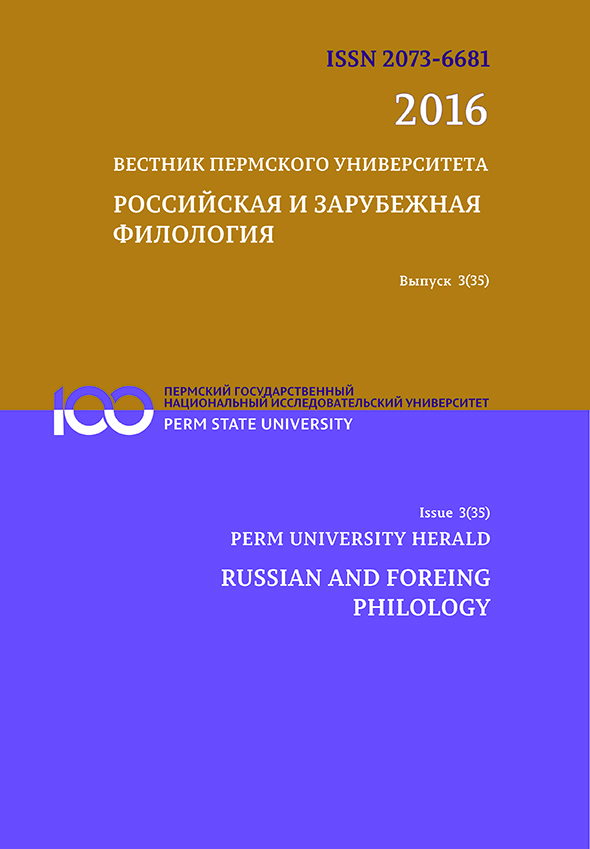NOTES ABOUT ARCHAIC VOCABULARY IN NORTHERN LAMENTATIONS BY E. V. BARSOV
DOI:
https://doi.org/10.17072/2037-6681-2017-4-73-82Keywords:
Russian Northern lamentations, Northern Lamentations by E. V. Barsov, archaic vocabulary, linguistic folklore studies, dialectology, semantic and motivational reconstruction, ethnolinguistics.Abstract
The vocabulary represented in Northern Lamentations collected by E. V. Barsov is still poorly examined and studied by linguists and folklorists, which is a very important problem, yet unsolved. Many words in this collection cannot be found in dialect dictionaries, which means that they are not seen by dialectologists, etymologists and ethnolinguists, though their structure, semantics, etymology and geography could be of interest for researchers. These words can be considered archaic, as they disappeared from speech at least in the second half of the 19th century, and give the possibility to see rituals and rites that are “behind” them. This vocabulary implements archaic semantic models, embodies ancient metaphors and peculiarities of the archaic way of thinking and, of course, needs interpretation. The article consists of two sketches, in which the author considers some words from Barsov’s lamentations. The first sketch refers to semantic dialecticisms – derivatives from the verb pakhat’ <to plough>: gorepashnitsa <woman who ploughs grief>, ‘self-denomination of a widow / orphan’, popakhat’ <to plough a bit>, ‘to sweep the grave on the Trinity Sunday’, spakhat’sya, ‘to show interest, attention, to care’. It has been established that the word gorepashnitsa is a derivative of the word pakhat’ (to plough) and functions in the frames of the Russian North archaic semantic transition model ‘to work hard’ → ‘to suffer’. The words popakhat’ and spakhat’sya originate from the word pakhat’ in a more ancient general Slavic meaning ‘to sweep’. The second sketch analyzes the context meaning of the verb otlit’, <to pour off>, which we meet in one of the lamentations as a part of a prayer: “O Lord, save thy bad people, pour off, o Lord, to these evil people, Meet them, o Lord, on the Second Advent”. One of the versions says that this verb in this context embodies the notion of the feud (to be more precise – of the mutual spill of the “valuable” liquids); another version refers to magical rites with the spillage of water and / or wax.References
Агапкина Т. А. Восточнославянские лечебные заговоры в сравнительном освещении: Сюжетика и образ мира. М.: Индрик, 2010. 824 с.
Березович Е. Л. Поймать остродыма: об одной лексической загадке русских народных говоров // Русский язык в научном освещении. 2015. № 1(29). С. 151–170.
Виноградова Л. Н. Та вода, которая… (Признаки, определяющие магические свойства воды) // Признаковое пространство культуры / отв. ред. С. М. Толстая. М.: Индрик, 2002. С. 32–60.
Герд А. С. Язык «Причитаний Северного края» // Причитанья Северного края, собранные Е. В. Барсовым: в 2 т. Т. 2. Рекрутские и солдатские причитанья. Свадебные причитанья / изд. подгот. Б. Е. Чистова, К. В. Чистов. СПб.: Наука, 1997. С. 603–618.
Куркина Л. В. Культура подсечно-огневого земледелия в зеркале языка. М.: Азбуковник, 2011. 367 с.
Пономарева С. Н. Функционирование полипрефиксальных глаголов в языке причитаний И. А. Федосовой // Язык русского фольклора / отв. ред. З. К. Тарланов. Петрозаводск: Изд-во ПГУ, 1992. С. 72–81.
Толстая С. М. Заметки о языке севернорусских причитаний // Язык и прошлое народа: сб. науч. ст. памяти проф. А. К. Матвеева / отв. ред. М. Э. Рут. Екатеринбург: Изд-во Урал. ун-та, 2012. С. 464–475.
Толстая С. М. Труд и мука // Толстая С. М. Пространство слова. Лексическая семантика в общеславянской перспективе. М.: Индрик, 2008. С. 114–120.
References
Agapkina T. A. Vostochnoslavyanskie lechebnye zagovory v sravnitel’nom osveshchenii: Syuzhetika i obraz mira [East Slavic Healing Spells in Comparative Coverage: Plots and Worldview]. Moscow, Indrik Publ., 2010. 824 p. (In Russ.)
Berezovich E. L. Poimat’ ostrodyma: ob odnoy leksicheskoy zagadke russkikh narodnykh govorov [To Catch the Ostrodum: about One Lexical Mystery of Russian Folk Dialects]. Russkiy yazyk v nauchnom osveshchenii [Russian Language and Linguistic Theory], 2015, issue 1(29), pp. 151–170. (In Russ.)
Gerd A. S. Yazyk «Prichitaniy Severnogo kraya» [Language of “Northern Lamentations”]. Prichitaniya Severnogo kraya, sobrannye E. V. Barsovym [Northern Region’s Lamentations collected by E. V. Barsov]. Ed. by B. E. Chistova, K. V. Chistov. St. Petersburg, Nauka Publ., 1997, vol. 2, pp. 603–618. (In Russ.)
Kurkina L. V. Kul’tura podsechno-ognevogo zemledeliya v zerkale yazyka [Slash-and-Burn Agriculture in the Mirror of Language]. Moscow, Azbukovnik Publ., 2011. 367 p. (In Russ.)
Ponomareva S. N. Funktsionirovanie poliprefiksal’nykh glagolov v yazyke prichitaniy I. A. Fedosovoy [Polyprefixal Verbs Functioning in the Lamentations by I. A. Fedosova]. Yazyk russkogo fol’klora [The Russian Folklore Language]. Ed. by Z. K. Tarlanov. Petrozavodsk, PetrSU Press, 1992, pp. 72–81. (In Russ.)
Tolstaya S. M. Trud i muka [Labour and Torment]. Prostranstvo slova. Leksicheskaya semantika v obshcheslavyanskoy perspective [The Space of a Word. Lexical Semantics in General Slavic Perspective]. Ed. by S. M. Tolstaya. Moscow, Indrik Publ., 2000, pp. 114–120. (In Russ.)
Tolstaya S. M. Zametki o yazyke severnorusskikh prichitaniy [Notes about the Language of Northern Russian Lamentations]. Yazyki proshloe naroda [People’s Past and Language]. Ed. by M. E. Rut. Ekaterinburg, Ural State University Press, 2012, pp. 464–475. (In Russ.)
Vinogradova L. N. Ta voda, kotoraya (Priznaki, opredelyayushchie magicheskie svoystva vody) [The Water that… (Signs Defining Magic Properties of Water)]. Priznakovoe prostranstvo kul’tury [Characteristic Cultural Space]. Ed. by S. M. Tolstaya. Moscow, Indrik Publ., 2002, pp. 32–60. (In Russ.)




